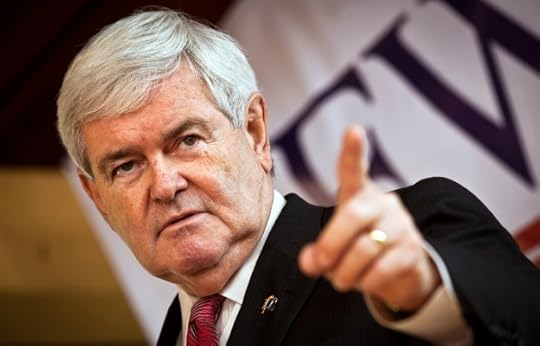How do you do nuanced foreign policy in the 3D, big screen TV era?

Newt Gingrich called the U.S.-Israeli decision to put off
joint military exercises scheduled for the Negev Desert "the greatest act of
presidential weakness he has seen in his lifetime." He was implying that it was
done to appease Iran. As it happens, according to the Atlantic's Jeffrey Goldberg, the exercises were put off not by the
U.S. but at the request of the Israelis. Facts aside, as they often are, the
only true weakness revealed by the statement is Gingrich's own. He's desperate.
If current polls are to be believed, the remaining shelf-life of his campaign
can be measured in hours. And that's a charitable assessment. More gimlet-eyed
observers might conclude the campaign hasn't been viable since it collapsed
from front runner status to also-ran in Iowa under the weight of the
candidate's blustering intemperance.
Gingrich, despite his declining political relevance, does
trigger a couple useful thoughts with this latest crudely inflammatory comment.
The first is that he reminds us what old-fashioned war mongering is really
like. War mongering, like cheese mongering and fish mongering, has a good
old-fashioned sound to it. It makes one think of the tub-thumping pols of old,
back in the days when war was glorious and generals watched battles from
astride white steeds high atop a hillside far from the action. Of course, like
all forms of mongering, it's a dirty business and even when it doesn't produce
mayhem and tragedy it leaves behind a dirty, smelly residue.
Ron Paul calls Gingrich and the others seeking to tough-talk
our way toward confrontation with Iran "chicken hawks." Not only does this have
a satisfyingly sleazy allusion to a sexual subculture within it, it also correctly
observes that it's no skin off Gingrich's expansive backside to urge America
into war with Iran.
The problem is that while Paul's war-avoiding impulse is
nobler than Gingrich's posturing, his approach to Iran suffers from a similar flaw.
Both are the classic product of political campaigns: they are not so much
policies as they are provocations, conceived as much to produce a reaction in
the lizard brains of potential followers as they are to actually suggest a way
to advance U.S. national interests. All the candidates are guilty of such
statements. Romney and Perry have also made over-the-top statements about what
they would do if they got their hands on Iran (not to mention over-the-top
statements about their devotion to Israel, their anger with the Chinese, their
contempt for Eurosocialism, and so on.)
The reason they overdo it is that nuance doesn't show up
well even on large-screen HD TVs. In fact, people viewing the world 55 diagonal
inches at a time want bright colors, action, drama, 3D foreign policy where all
the bits and pieces seem to fly right off the screen and straight into your
living room. It's one of the reasons
that foreign policy often plays a secondary role in campaigns.
That said, 3D full-color, high-impact nuance is not
impossible. And the irony is that nothing illustrates this as well as the Obama
administration's smart, multi-layered, tough and often courageous Iran policy. You
can tell it's nuanced because so few people are happy with it. Today, for
example, on "Morning Joe," Zbigniew Brzezinski asserted that the covert attacks
on Iranian nuclear scientists presumably undertaken by the Israelis perhaps
with the tacit endorsement of the U.S. "debased" foreign policy. Now, there are
few people in the U.S. foreign policy community for whom I have greater regard
than Brzezinski. But this remark bemused and troubled me. On the one hand I
find the notion that foreign policy can be debased laughable when it so often
deals in death, lying, bribery, and other such practices. More importantly, I
can't help but think that Brzezinski wouldn't have minded such actions against
Soviet enemies during the Cold War. He just doesn't think the threat posed by
Iran is comparable (it's not) nor does he, I believe, much like the U.S. working
so closely with Israel (a more complicated issue than we can deal with here
effectively.) But the boldness of these attacks -- like the Stuxnet cyberattack
and the drone activity in that country -- has sent a message that has clearly
been received by the Iranians as well as the critics. This president and his
allies are not simply going to rely on "soft power" to contain the Iranian
nuclear threat, especially when it seems clear that Tehran has such disregard
for diplomacy and prescribed international processes. This makes threats to do
more credible and the ability to achieve goals while doing less likely.
At the same time, the administration's "soft power"
tourniquet has also been applied effectively. Not only are have they maintained
for many months tireless multichannel diplomatic efforts to nudge the Iranians
to an agreement to stop its progress toward the development of nuclear weapons,
they have engineered one of the most effective economic sanctions programs
undertaken by the international community against any nation in the recent
history of the world. "Soft" though this power may be, it is causing real pain
and discomfort for Iran's leadership. In a region that has seen plenty of
governments totter under economic stresses, the ayatollahs increasingly are
seen as wanting a way out from the pressure. (The situation in Iran has
reportedly gotten so bad that periodically Mahmoud Ahmadinejad bolts from
Tehran to go to his home town far from his enemies in the high ranks of the
government...and then must be escorted back to the capital at the emphatic
insistence of his bosses in the top tiers of that country's religious
hierarchy.)
The point is that the president takes the threat seriously
and has for now at least, found a way to very forcefully deliver a message that
Iran must cease and desist without actually going to war. Should he have to take that next step, he will
be able to honestly say that thing every president should be able to assert
prior to putting troops in harms way, that he has tried every other available
option. He has also approached this problem in conjunction with the
international community thus adding both legitimacy and effectiveness to the
undertaking.
The GOP candidates will wave their arms and talk tougher
than teen-aged boys in a locker room. Or, in the case of Paul, he will talk
tough and wave off serious threats as someone else's problems. But they will
all overstate because they think they must...even as the President admirably
illustrates that there is another course, one that involves such a complete and
energetic use of almost every tool short of open warfare in the national
security tool box that I suspect someday if things turn out right (and no
foreign policy initiative can guarantee an outcome because, of course, other
players and many variables are involved) it will be studied as an example of how
to do foreign policy right-big, bold, 3D and nuanced.
David Rothkopf's Blog
- David Rothkopf's profile
- 120 followers



